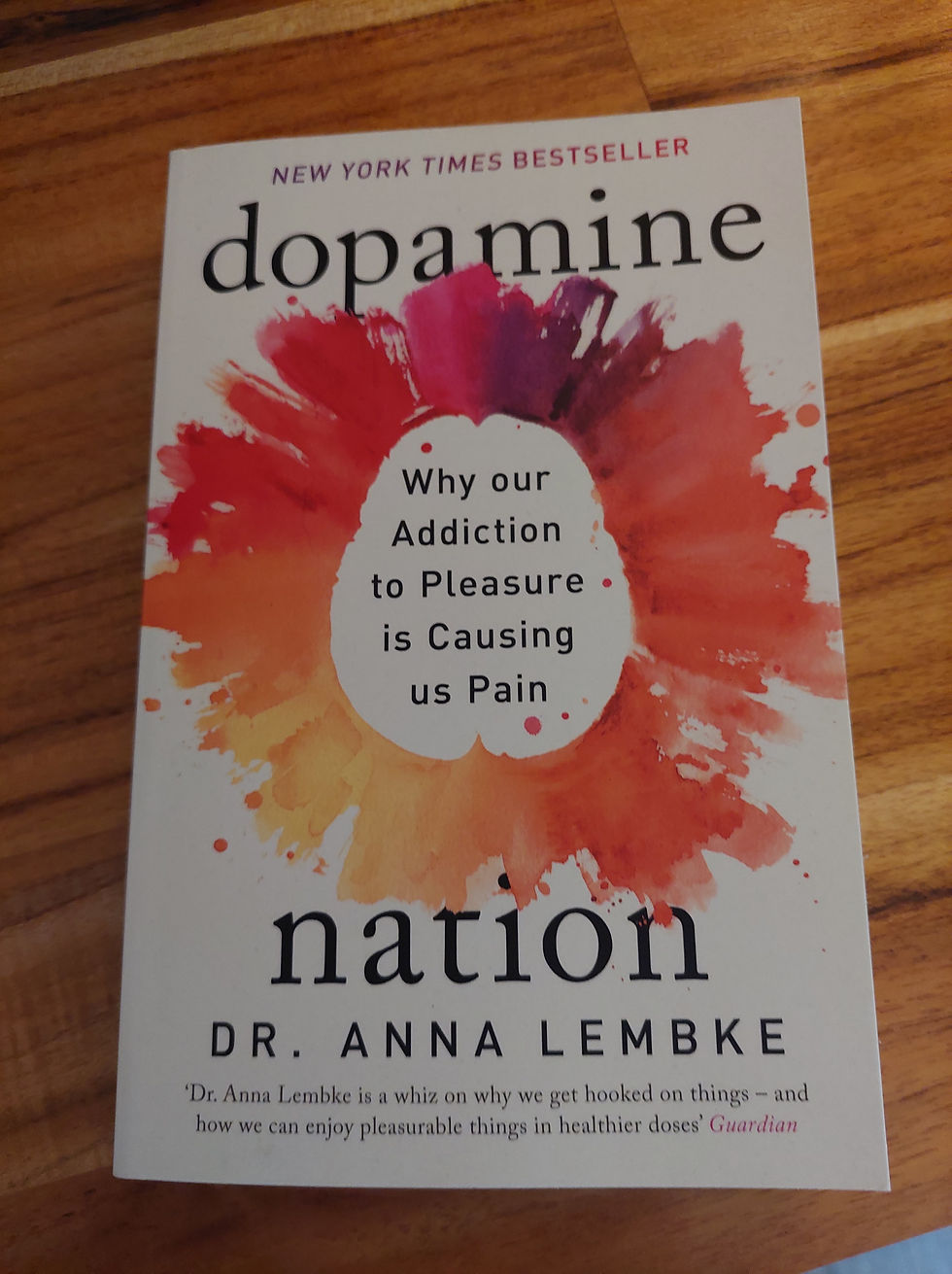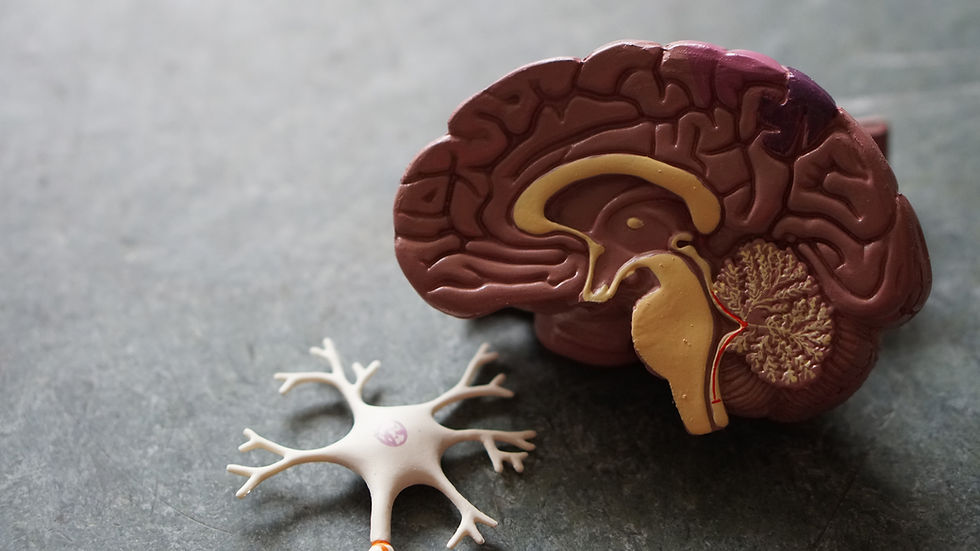Alcohol changes your brain – Part 1
- Marie Helene M

- Jun 11, 2024
- 4 min read
Why understanding the impact of alcohol addiction is helpful when you struggle with addiction? I think that having a better understanding what alcohol does to your brain and how your brain becomes addicted can be very powerful because suddenly, it’s not you who is broken, bad, who hasn’t the willpower to control it, but it’s what happened in your brain when the addiction is starting and developing because of the alcohol to a biomolecular level. It’s science, it’s chemistry, it’s not you being deficient.
I’m not sure if this will interest you as much as me. When I quit drinking alcohol, I heard about how alcohol changes the brain neurotransmitters very briefly, and for me it was a relief. I wasn’t the only guilty of not being able to control alcohol. Alcohol was screwing with my brain, impacting the chemistry of it to many different levels, ruining my mental health with a looming low-grade depression, frequent peaks of anxiety and a non-existent self-esteem. Now, I could understand more I was depressed, anxious and feeling like shit more generally with scientific facts.
I became much more passionate and I’m now in the middle of completing a short online course about the neurobiology of addiction with Stanford University. The academic director of this course is Anna Lembke. If you know me, you’ll know how I admire and recommend her book ‘Dopamine Nation’ nearly every day. If you haven’t read it yet, I do encourage you to read it.
I’ve tried to break it down simply, but the brain isn’t a simple thing. I’ve watched 4 times a video explaining how the neurons in the brain were communicating before I could understand the process, and remember the neurons parts as well as what was a synapse.

What is addiction?
Addiction is a complex neurobiological disorder characterised by compulsive substance seeking and use (or behaviour like gambling, shopping, gaming, watching porn, etc.), despite harmful consequences. The neurobiology of addiction involves various brain regions, neurotransmitters, and neural circuits. Alcohol addiction, in particular, showcases the intricate interplay between the brain's reward system and other neural mechanisms. Depending of the substance, the neurotransmitters involved and reacting will differ so we’ll focus only on alcohol addiction.
The Brain's Reward System and Dopamine
Dopamine is a neurotransmitter; it means that it is a molecule that plays a crucial role in our motivation to keeps us alive. Without motivation, we would not try to feed ourselves and would let ourselves die. Dopamine acts on areas of the brain to give you feelings of pleasure and satisfaction. It also plays a role in controlling memory, mood, sleep, learning, concentration, movement and other body functions.
The reward system in the brain is primarily mediated by the neurotransmitter dopamine. Dopamine is produced in several areas of the brain, including the ventral tegmental area (VTA) located in the middle of the brain going through the limbic system up to the pre-frontal cortex. The VTA is particularly significant in the context of addiction. When a person consumes alcohol, it stimulates the release of dopamine in the nucleus accumbens (NAc), located in the limbic system, creating a powerful positive emotion related to the stimulus alcohol. It triggers the signal to the neurons to release more dopamine and reinforces the motivation to reach to the stimulus.

The release of dopamine creates feelings of pleasure and reinforcement, which can lead to repeated alcohol use as the brain seeks to replicate this pleasurable experience. The pre-frontal primary function associates the memory of this pleasurable feeling to the stimulus being alcohol. Your brain remembers and understands this: alcohol makes me feel good.
When the pleasure fades away
Over time, the brain's reward system becomes increasingly sensitised to alcohol, leading to a cycle of craving and consumption. This heightened sensitivity is a hallmark of addiction, as individuals find it increasingly difficult to experience pleasure from everyday activities that do not involve alcohol. The pleasure decreased because the release of dopamine is intense and frequent which long-terms leads to a lower dopamine baseline level.
In other words, the more you drink, the less you feel the high, the more you are overall depressed. Those all contains the concept of neuroadaptation of the brain i.e. your brain is changing, and your tolerance is developing i.e. you need more for a lower high than before.
Neuroadaptation
Over time, the brain reduces the sensitivity of the dopamine system to balance the increased dopamine activity caused by alcohol. This reduction can involve:
Downregulation of Dopamine Receptors: The brain may reduce the number of dopamine receptors or their sensitivity, making dopamine signaling less effective.
Decreased Dopamine Production: The brain may also decrease the production of dopamine as a response to prolonged alcohol exposure.
Because your brain is so smart, it autoregulates by itself so you don’t have to worry about it. The brain trying to rebalance (homeostasis process) thinks ‘hey, we received so much ‘feel good’ with that alcohol poured on us so often, let’s tell our dopamine pumps regulator to take a break a bit and close some dopamine receptors for now. We’re on holidays yippieee!’.
Simply, it means that when you’re used to drink alcohol, life is pretty grey when not boozy. Slowly all the colours of life fade away, the little pleasure like playing with your kids are just boring chores and the only thing that will bring you a sense of relief, joy or comfort is to have a drink. This is because your dopamine baseline is lower, your brain is taking a little break in dopamine production because alcohol does the job for you…until it doesn’t right…

For today’s post, I thought it was important to simply focus on dopamine, most likely one of the most well-known neurotransmitters nowadays.
In the next blog post, I’ll introduce GABA and Glutamate, two other neurotransmitters affected by the substance alcohol. In the meantime, if alcohol is disrupting your life, darkening slightly everything, increasing your anxiety and making you feel unwell, or ashamed, or just damn tired and fed up, feel free to get in touch if you’d like to have more information and receive tailored support and counselling services.




